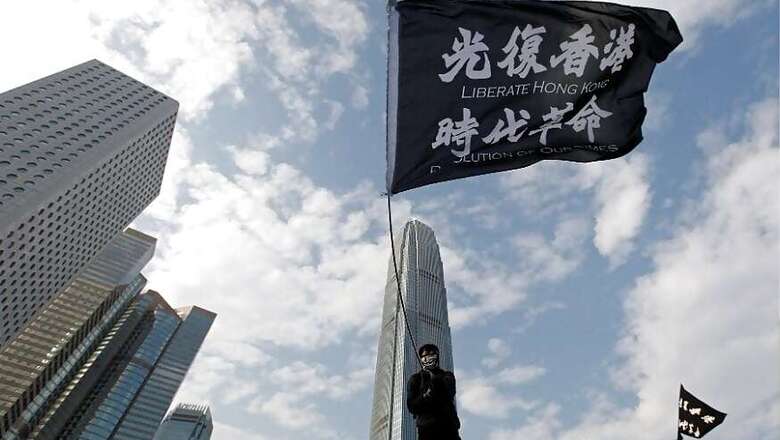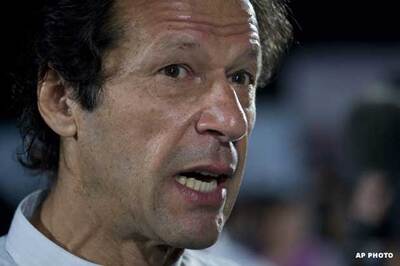
views
China’s leader, Xi Jinping, has made one of his boldest political gambits yet, wagering that he can tame Hong Kong through national security legislation, despite the risk of fresh upheavals there and a new flash point with the United States.
The security proposals, unveiled Friday at the delayed opening of China’s annual legislative session, scotched any expectations that the coronavirus pandemic might have left Xi humbled, cautious or ready for compromise. On the contrary, he has chosen to press an offensive over Hong Kong, riling Western powers, at a time of global crisis while China is struggling to pull out of its sharpest economic slump since former Communist Chairman Mao Zedong’s time.
Xi has etched in blazing colors an outline of a post-pandemic world in which China shoulders past Western nations seen as divided, irresolute and now sapped by the virus and a looming economic slump. At the opening of the National People’s Congress, leaders exuded confidence that China had pulled out of the pandemic crisis faster and in better shape than much of the world.
“Through the hard work and sacrifice of our entire nation, we have made major strategic achievements in our response to COVID-19,” Premier Li Keqiang said in his work report to the congress, a kind of annual State of the Nation speech.
The move on Hong Kong aligns with Xi’s forceful vision of a “great rejuvenation of the Chinese nation” free of internal rifts. And he appears steeled for any economic, political and diplomatic blowback.
By imposing the national security legislation, Xi has cast aside the deference for Hong Kong’s distinctive legal status that his predecessors observed. Instead, he has taken an unabashedly interventionist approach that is constricting — critics say strangling — the “one country, two systems” framework that granted Hong Kong extensive autonomy after the territory’s return to Chinese sovereignty.
To justify the legislation, the Chinese leadership has depicted Hong Kong as besieged by chaotic forces whose shadowy foreign backers are seeking to tear China apart.
Wang Chen, a Politburo member who explained the security legislation plans Friday, denounced protesters who have called for independence and stormed central government offices. The legislation would allow the mainland’s feared security agencies to set up their operations publicly in Hong Kong for the first time, instead of operating on a limited scale in secrecy.
Xi is imposing the security legislation at a time when China already faces serious challenges.
Its post-pandemic economic recovery remains clouded. While the struggles were overshadowed by the security legislation, the point was underscored when Li announced that this year the government would not set an annual growth target for the first time in a quarter century.
The pandemic brought China’s economy to a grinding halt from late January through early March. Further outbreaks, like one in the country’s northeast, threaten to delay recovery in the rest of the year as consumers remain scared to spend and factories still aren’t going at full tilt.
The Hong Kong legislation also raises the possibility of renewed unrest in Hong Kong. Some protesters called for demonstrations this weekend, although many democracy advocates seemed despondent Friday.
“I think most young people right now are feeling at a loss; everyone still thought there was a lot of room for resistance last June,” said Jannelle Leung, 25, a pro-democracy district counselor, referring to the start of the protest movement last year. “But now the Chinese Communist Party has furthered its suppression.”
The territory has already experienced an uptick in emigration, particularly by young people and families. “I want to leave Hong Kong because the future of Hong Kong is too hard to anticipate,” said Jolie Tam, a 33-year-old housewife with a 1-year-old daughter.
Above all, the proposed security legislation may give new momentum to senior figures in the Trump administration and Congress who have increasingly accused China of threatening the security, prosperity and even the basic health of Americans.
This week, Secretary of State Mike Pompeo suggested that the Trump administration could stop treating Hong Kong as a separate economic entity from mainland China, an important underpinning of the territory’s easy trade access to the United States.
If passed, the national security proposals “would be a death knell for the high degree of autonomy Beijing promised for Hong Kong,” Pompeo said in an emailed statement. “The United States strongly urges Beijing to reconsider its disastrous proposal.”
Xi appears to believe that the greater risk to him comes from allowing Hong Kong to continue as a stubborn base for protesters who challenge Communist Party rule and increasingly reject Chinese sovereignty over the territory. Since Xi came to power in 2012, the Chinese government has arrested dissidents and human rights lawyers, ramped up censorship and sent hundreds of thousands of Muslims into internment camps.
The Basic Law — Hong Kong’s miniconstitution — requires the territory to introduce national security legislation. But successive Hong Kong leaders have held back from doing so after an earlier attempt was crushed in 2003 by huge protests.
After the protests roiled Hong Kong last year, Xi signaled that he’d had enough.
A Chinese Communist Party leadership meeting in late October called for steps to “safeguard national security” in Hong Kong while leaving observers guessing on when and how that might be achieved.
The legal language that Beijing will eventually adopt is likely to draw heavily on the Hong Kong government’s unsuccessful bill in 2003 together with similar legislation taken up in nearby Macao, said Lau Siu-kai, vice president of the Chinese Association of Hong Kong and Macao Studies, an elite Beijing advisory group.
The issue has gained momentum in the intervening months.
The pro-democracy opposition has nearly paralyzed the Hong Kong legislature since October in an attempt to block passage of a law protecting China’s national anthem seen as a threat to free speech. The tensions between the two sides have made Beijing more skeptical of the Hong Kong government’s ability to pass national security legislation.
“I can understand their concern; it’s probably deeper and stronger than ours,” said Ronny Tong, a member of the top advisory body to Hong Kong’s leader, Carrie Lam. “They can see our legislature is not functioning at all.”
Beijing’s security plan left its political allies in the city deeply divided. On one side were hard-liners like Lau, who called for stringent security laws and a greater role for the mainland in Hong Kong affairs. On the other were moderates from the business community and the upper echelons of Hong Kong’s British-trained civil service, who wanted the city to solve its issues with as little involvement from Beijing as possible.
Regina Ip, a Cabinet member who leads a pro-Beijing party in the legislature, has long called for Hong Kong to pass its own security laws but said she had recently concluded that this was no longer possible in the polarized political atmosphere.
Hong Kong “simply does not have the capacity or political will to do so,” she said in a telephone interview.
Chris Buckley and Keith Bradsher c.2020 The New York Times Company




















Comments
0 comment